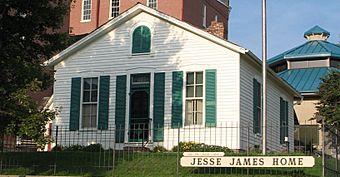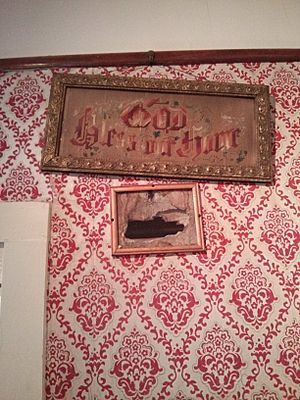Jesse James Home Museum facts for kids
Quick facts for kids |
|
|
Jesse James House
|
|
|
U.S. Historic district
Contributing property |
|
 |
|
| Location | 12th St. and Mitchell Ave., St. Joseph, MO |
|---|---|
| Area | less than one acre |
| Built | 1880 |
| Architectural style | Greek Revival |
| NRHP reference No. | 80002319 |
| Added to NRHP | September 4, 1980 |
The Jesse James Home Museum is a famous house in St. Joseph, Missouri. It's where a well-known person named Jesse James lived and was shot on April 3, 1882. A man named Robert Ford shot him. The house is a single-story building built in the Greek Revival style. It is about 24 feet wide and 30 feet deep.
Contents
The Jesse James Home Museum
Where is the House?
When Jesse James lived there, the house was at 1318 Lafayette Street in St. Joseph. In 1939, it was moved to a busier road called Belt Highway. Later, in 1977, the house was moved again. It now sits right behind the Patee House at 12th and Mitchell. This new spot is only two blocks from its first location, which helps visitors understand its history better.
What Happened After the Shooting?
The investigation into Jesse James's death happened at the Patee House Hotel. This hotel used to be called the World's Hotel. Jesse's wife, his two children, and his mother stayed at the Patee House for two nights after he was killed.
The Bullet Hole Mystery
Inside the house, on the north wall, there is a large bullet hole. When it first happened, the hole was much smaller. But over many years, people who visited the house carved small pieces from the hole. They did this to keep as souvenirs, which made the hole much bigger than it originally was.
Inside the Museum
The Jesse James Home Museum displays many items that belonged to Jesse James and his family. These items help tell the story of their lives.
Solving a Mystery with Science
In 1995, a top scientist named Professor James E. Starrs from George Washington University helped solve a big mystery. There was a long-standing debate about whether the body buried as Jesse James was truly his. Professor Starrs led a team to dig up Jesse James's grave. They wanted to use science to find out for sure.
In February 1996, Professor Starrs announced the results. DNA tests were done on the remains from the grave. This DNA was compared to the DNA of Jesse James's living relatives. The tests showed a 99.7% chance that the body in the grave was indeed Jesse James.
The museum now has new exhibits based on this important discovery. These exhibits include things found during the exhumation, like parts of coffin handles and small pieces of wood. There is also a pin that Jesse James wore in his death photo. Many photos taken during the exhumation are also on display.
A Historic Landmark
The Jesse James Home was officially added to the National Register of Historic Places on September 4, 1980. This means it is recognized as an important historical site. It is also part of the Patee Town Historic District, which is another area with many historic buildings.
 | Janet Taylor Pickett |
 | Synthia Saint James |
 | Howardena Pindell |
 | Faith Ringgold |



